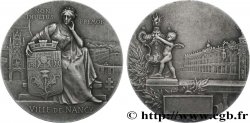fme_999543 - TERZA REPUBBLICA FRANCESE Médaille, Philippe d’Orléans, frappe médaille module de 10 centimes
15.00 €
Quantità
Aggiungi al carrello

Tipo : Médaille, Philippe d’Orléans, frappe médaille module de 10 centimes
Data: 1899
Metallo : ottone
Diametro : 30,5 mm
Asse di coniazione : 12 h.
Peso : 7,84 g.
Orlo : lisse
Marchio : sans poinçon
Commenti sullo stato di conservazione:
Patine hétérogène avec des traces d’usure, quelques coups et rayures . Présence de tâches d’oxydation
Diritto
Titolatura diritto : PHILIPPE DUC D’ORLÉANS 1899.
Descrittivo diritto : Son buste de trois-quarts à gauche.
Rovescio
Titolatura rovescio : JE NE VENGERAI QUE LES INJURES FAITES Â LA NATION * PHILIPPE * / SUR HUIT LIGNES : JE / REPLACERAI / MON PAYS / AU PREMIER RANG / DES NATIONS / AVEC LE CONCOURS / DE TOUS LES VRAIS / FRANÇAIS.
Descrittivo rovescio : Légende circulaire et en 8 lignes.
Commento
Il existe une autre version très proche datée 1900 et une autre variée et datée de 1909 avec la formule Tout ce qui est national est nôtre.
Philippe, duc d'Orléans est surtout resté dans l'Histoire pour être retourné en France, en 1890, bravant ainsi les lois d'exil qui, depuis 1886, en tenaient la famille royale éloignée. Arrêté après s'être présenté au bureau de recrutement de Paris pour faire son service militaire (ce qui lui valut le surnom de "prince gamelle"), il fut condamné à deux années d'emprisonnement et expulsé. Prétendant au trône de France depuis la mort de son père, en 1894, il vécut l'essentiel de sa vie en Angleterre. Marié en 1896 à l'archiduchesse Marie-Dorothée d'Autriche, il mourut sans descendance en 1926. Ses droits dynastiques passèrent alors à son cousin Jean, duc de Guise, père du Prince Henri d'Orléans (biographie extraite de http://www.musee-orsay.fr/fr/evenements/expositions/archives/presentation-generale/browse/12/article/photographies-de-philippe-duc-dorleans-4189.html?tx_ttnews[backPid]=252&cHash=70b983c279 ).
There is another very similar version dated 1900 and another varied one dated 1909 with the formula Everything that is national is ours. Philippe, Duke of Orléans, is remembered above all for having returned to France in 1890, thus defying the exile laws which, since 1886, had kept the royal family away. Arrested after presenting himself at the Paris recruitment office to do his military service (which earned him the nickname \\\"Prince Gamelle\\\"), he was sentenced to two years of imprisonment and expelled. A pretender to the throne of France since the death of his father in 1894, he lived most of his life in England. Married in 1896 to Archduchess Marie-Dorothée of Austria, he died without descendants in 1926. His dynastic rights then passed to his cousin Jean, Duke of Guise, father of Prince Henri of Orléans (biography taken from http://www.musee-orsay.fr/fr/evenements/expositions/archives/presentation-generale/browse/12/article/photographies-de-philippe-duc-dorleans-4189.html?tx_ttnews[backPid]=252&cHash=70b983c279 )
Philippe, duc d'Orléans est surtout resté dans l'Histoire pour être retourné en France, en 1890, bravant ainsi les lois d'exil qui, depuis 1886, en tenaient la famille royale éloignée. Arrêté après s'être présenté au bureau de recrutement de Paris pour faire son service militaire (ce qui lui valut le surnom de "prince gamelle"), il fut condamné à deux années d'emprisonnement et expulsé. Prétendant au trône de France depuis la mort de son père, en 1894, il vécut l'essentiel de sa vie en Angleterre. Marié en 1896 à l'archiduchesse Marie-Dorothée d'Autriche, il mourut sans descendance en 1926. Ses droits dynastiques passèrent alors à son cousin Jean, duc de Guise, père du Prince Henri d'Orléans (biographie extraite de http://www.musee-orsay.fr/fr/evenements/expositions/archives/presentation-generale/browse/12/article/photographies-de-philippe-duc-dorleans-4189.html?tx_ttnews[backPid]=252&cHash=70b983c279 ).
There is another very similar version dated 1900 and another varied one dated 1909 with the formula Everything that is national is ours. Philippe, Duke of Orléans, is remembered above all for having returned to France in 1890, thus defying the exile laws which, since 1886, had kept the royal family away. Arrested after presenting himself at the Paris recruitment office to do his military service (which earned him the nickname \\\"Prince Gamelle\\\"), he was sentenced to two years of imprisonment and expelled. A pretender to the throne of France since the death of his father in 1894, he lived most of his life in England. Married in 1896 to Archduchess Marie-Dorothée of Austria, he died without descendants in 1926. His dynastic rights then passed to his cousin Jean, Duke of Guise, father of Prince Henri of Orléans (biography taken from http://www.musee-orsay.fr/fr/evenements/expositions/archives/presentation-generale/browse/12/article/photographies-de-philippe-duc-dorleans-4189.html?tx_ttnews[backPid]=252&cHash=70b983c279 )








 Segnalare un errore
Segnalare un errore Stampate la pagina
Stampate la pagina Condividi mia selezione
Condividi mia selezione Fai una domanda
Fai una domanda Consegnare / vendere
Consegnare / vendere
 Descrittivo
Descrittivo









